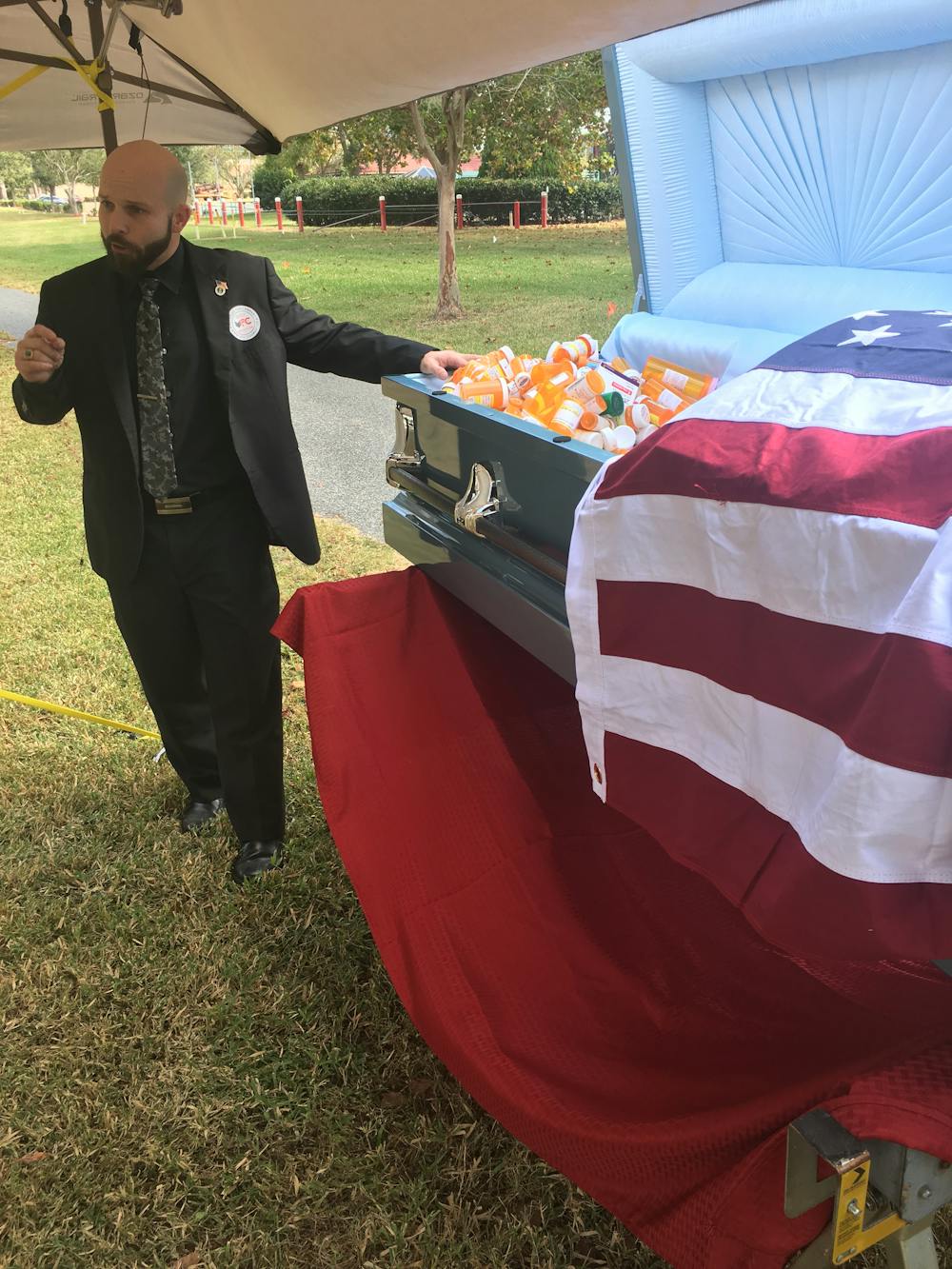For more than two years, U.S. Navy veteran Gabriel George wasn’t in control.
A motorcycle accident in 2009 left George in a coma for three weeks, with a paralyzed right arm and two fractures to his neck vertebrae. Through 2011, he tried everything from Percocet and morphine to spinal cord stimulators. It wasn’t until his doctor recommended medical marijuana the 31-year-old said he felt like himself again.
“I was on every pill they could prescribe me, all it did was zombify me or constipate me,” he said. “I’m here now, I’m alive because I’m a medical marijuana user.”
George and five others spent Veterans Day protesting outside the Malcom Randall VA Medical Center, located at 1601 SW Archer Road, fighting opioid deaths and in support of medical marijuana for veterans.
The veterans marched across the intersection of Southwest Archer Road and Center Drive carrying a casket draped in an American flag. At the front lawn outside the hospital, the group then folded the flag and poured hundreds of empty pill bottles inside the open casket.
Joshua Littrell, a protest organizer and the founder of the nonprofit Veterans for Cannabis, said the demonstration was meant to show how deadly opioids are.
With grief in his eyes, Littrell called for a moment of silence.
“Each one of these bottles is a brother and sister no longer with us,” the 37-year-old U.S. Air Force veteran said. “Each one of these here is a life.”
Gathered at the side of the casket, as cars on Southwest Archer Road honked in support of the group’s signs that read “Pills Kill, Cannabis Saves Lives,” the veterans shared their stories.
Michael Thompson held his wife DeAnn’s hand and fought back tears.
It was Oct. 10, 2008, when Thompson’s daughter, Cheyenne, passed away from grand mal seizure. She was a month shy of her third birthday. Shortly afterward, the U.S. Air Force veteran turned to alcohol and tried to take his own life.
He eventually turned to marijuana to treat the emotional trauma he felt and later learned the drug might have helped Cheyenne’s genetic predisposition to seizures.
“The only thing that mattered to me in the world was my daughter, and I couldn’t fix her,” he said. “My daughter could still be alive today, if she had access to cannabis.”
For U.S. Army veteran Jimmy Johnston, access to marijuana is the difference between life and death.
Johnston, a lead coordinator for pro-marijuana and veteran support group Weed for Warriors, said he’s seen veterans wait as long as two and a half years for an MRI scan, get hooked on pills and then turn to cheaper street drugs like heroin when they can’t afford what the VA prescribes.
So much of the pain, addiction and overdose could be solved with medical cannabis, he said.
“One plant to treat it all,” he said. “Instead of the 20 different medications the VA is trying to prescribe you, you got one plant that will solve all of it with no side effects.”
Littrell, who served as an army biomedical engineer, said he plans to take Veterans for Cannabis’ platform to Washington, D.C., to urge Florida and Georgia representatives to grant veterans greater access to medical cannabis.
Any demonstration he organizes, be it a protest or lobbying effort in Tallahassee, he wears a suit and tie and never says “marijuana,” only cannabis. Otherwise, no one would take his group seriously, he said.
“I thought my fighting days were over when I got out of the Army,” Littrell said. “They’re not. Now I’m fighting for my brothers and sisters here at home, to make sure we’re getting the care we’re owed.”
Veterans for Cannabis founder Joshua Littrell speaks about opioid deaths among veterans Saturday outside the Malcom Randall VA Medical Center, located at 1601 SW Archer Road. Littrell and four other veterans protested by filling a casket with empty prescription pill bottles. “Each one of these bottles is a brother and sister no longer with us,” he said.
From Left: Veterans Jimmy Jonhston, Gabriel George, Michael Thompson and Joshua Littrell carry a casket full of empty pill bottles Saturday outside the Malcom Randall VA Medical Center, located at 1601 SW Archer Road. The four veterans and Thompson’s wife, DeAnn, protested the over prescription of opioid pills and advocated for medical cannabis.






